The Chinese Communist Party (CCP) has intensified efforts to influence the media in the United States as part of a multibillion-dollar global campaign to shape public opinion in its favor, according to a new report.
Freedom House in its “Beijing’s Global Media Influence” report released on Sept. 8 found that the Chinese regime and its proxies were using “more sophisticated, covert, and coercive tactics” to propagate pro-Beijing narratives, spread disinformation, and stamp out unfavorable news.





